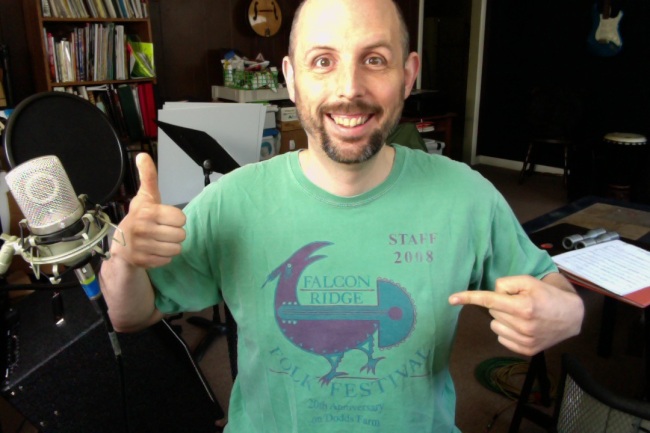Getting to Know Phil Henry
Phil Henry knows his way around the folk music scene. He’s made his mark at several festivals and songwriting competitions in the past several years. His songs are memorable—they’re the kind of songs that you find yourself humming a day or two after you’ve heard them. That’s the sign of a good song! Phil and his trio bandmates, Jeff Kimball and Gary Moon, are all psyched to be part of the Falcon Ridge Folk Festival Emerging Artists showcase this year.
Falcon Ridge is celebrating its 25th anniversary the first weekend in August and the Emerging Artist showcase is always one of the highlights of the festival. The musicians are chosen by a three-member jury and are given the opportunity to perform two songs (not to exceed ten minutes).* The audience votes for their favorites and three or four acts are asked to return to the main stage the following year.
There’s more to discover about Phil Henry at his website.
Your bio states that you were inspired to take up songwriting after seeing Martin Sexton in concert. Can you recall what it was about that performance that got you hooked?
My exposure to folk music when I was younger always fit into two categories. Either traditional folk from the British Isles and Appalachian mountain music, or else 60’s folk revival music that included songwriters like Dylan, Paul Simon, Peter Paul and Mary, Kingston Trio and the like. I had a picture in my mind of what you could do with one guitar and your voice, and seeing Martin Sexton changed that. He has the energy of a soul singer and his guitar kicks like a rock band. The fact that he could be accepted under the “folk” umbrella made me think differently about the kind of music that I wanted to make.
Your story songs are very special. ”Ruthie’s General Store” is especially poignant. Was that a real incident or is it just part of Phil Henry’s imagination?
“Ruthie” tells the story of a Mom and Pop grocery after World War II which burns down. My grandparents did have a grocery store in Malone, NY, a little farm town near the Canadian border in New York. Eventually the whole building burned, and though that happened long before I was born, I remember the newspaper photo and how emotional my parents were about it. So, although a lot of the details of the story have changed, that imagery is what I built the song around.
I continue to be really interested in telling stories in songs, complete with characters and scene and plot. There’s a large bit of imagination involved, but there’s always a thread of truth. It might not be true details, but certainly the emotional content, and maybe that’s the way to keep it relevant for a listener.

I’ve always been impressed by the power of MAKING things, rather than just buying things. It’s amazing to me that ordinary people choose to, say, build their own houses. That’s what attracted me to music too- I can write a song, I can assemble an album- I can record it myself… So, yes, I’ve built some instruments- An Irish bouzouki, a dulcimer, a J-45 copy I use as a slide guitar, and now I’m assembling a telecaster-style electric. Nothing I’ve made really beats the quality of a fine instrument. I play a real Gibson J-45 as my main instrument- but there’s a certain amount of pride with having built something from scratch.
Are you still directing a chorus at a school in Vermont? What’s that like? Have you ever taught them a Phil Henry song?
Through teaching, I can make music full-time, year-round. I have a “day-job,” as they say, but it never has felt like work. I teach music at a little K-12 school, so in one day I may be teaching 3rd graders recorder, doing African djembes with Middle Schoolers, or directing High School Chorus.
I try not to interject my own music on my students, although I have a Rock Band ensemble, and that group has snuck my song “Hold Up” (a story song about a Rutland, VT bank robbery) into our performance sets! Most of the time, I’d rather connect kids with folk music through more traditional American folk music. “This Land Is Your Land” is still really popular with the 3rd and 4th Grade set….and I always teach the “No Trespassing” verse!
*The Falcon Ridge judging panel changes year to year. Many thanks to this year’s panel, Carter Smith, producer of Common Ground Community Concerts in Hastings-on-Hudson NY, Dennis O’Brien, talent buyer for the Newtown Theater in Newtown PA and Kathy Sands-Boehmer, booker for the Me & Thee Coffeehouse in Marblehead MA now in its 43rd year of presenting great acoustic music.




